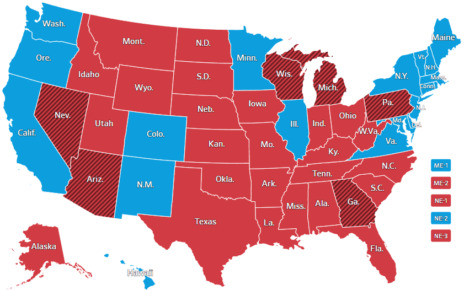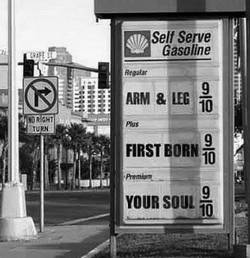New Jersey voters passed a constitutional amendment to raise the state’s minimum wage from $7.25 to $8.25 and to tie future minimum wage increases to inflation. This raise will affect businesses and workers alike.
The amendment passed 60 percent to 40 percent, according to USA Today.com. Before the vote, Gov. Chris Christie had vetoed the bill (A2162) passed by the New Jersey Legislature in 2012. The Legislature voted to have it placed on the ballot where it passed on Nov. 5.
Christie said that raising the minimum wage was not a good idea. He said it was, “Just an irresponsible thing to do.” He has also called it “a truly ridiculous idea” to write the minimum wage increases into the state constitution, according to a USA Today article.
“The money doesn’t come off a magic money tree. The money comes from the pockets and the hard work of the small-business owners,” Christie said.
Aimee Parks, Assistant Director of Human Resources for Student Employment said that there are 1,048 Federal Work Study (FWS) placement students. Parks said that there will be meetings regarding the effects of the new wage. She also said this will make student positions more competitive. “Our office expects more students will want to work on campus and on campus [jobs] will be even more competitive. It will be a good motivator for students to sign up for their job in advance next fall,” said Parks.
Parks said there would be effects to student employees and employers for Federal Work Study students. “Employers might want to hire more FWS students and spread out their work hours. If students use up their FWS awards, some may have to stop working if department budgets do not allow for Student Help employees.”
Parks explained that right now, before the minimum wage is raised, it costs $1.88 to have a FWS student work in a department on campus but with the minimum wage being raised it will cost $2.06. For someone who is not FWS, it will now cost $8.25 instead of $7.25.
According to Parks, 76 percent of University student employee placements will be receiving some type of pay increase starting Jan. 1, 2014. This increase could be from $0.75 and $0.05.
John Buzza, a specialty professor of management and decision sciences believes students, whether it is part-time jobs or jobs sponsored through the University, will be asked to do more. “I think employers might ask them to do more, add additional responsibilities to their workload simply because they are paying them more,” said Buzza.
Parks said that she hopes students will “grow and utilize their talents” with their employers. “More than ever before it needs to be instilled in student employees and their supervisors that this is a professional job in a professional setting and it expected that students take their position seriously. Students have such a great place to ask for additional responsibility in order to grow as a professional,” said Parks.
Kimberlee Noordyk, a freshman social work major, said, “I work at stop and shop and my paycheck is disgusting; definitely not enough to make it through even half a week. I would love the minimum wage to be raised for my personal needs but at the same time, I would feel bad accepting that paycheck knowing the potential harm the raise has on the community.”
Garrett Brown, a freshman communication major said, “Great thing for us students. I’m scared some business might be closing.”
Danielle Frassetti, a freshman communication major said, “I think it will cause the unemployment rate to rise. It sounds good in theory but in reality, employers will either have to raise their prices or lay off employees in order to meet their additional expenses.
Anthony Barberio, a freshman business major said, “I think minimum wage should be something more of a progressive type law. For example, a company like Wal-mart that takes in literally billions upon billions of dollars should be forced to pay their employees more than a small family run business in a small town, that way small businesses would be safe. Also I think expectations for a new minimum wage are too high. Campaigning for something along the lines of $9.00 per hour is understandable but $15.00 dollars is absurd. $15.00 is obtainable but it has to be earned not given.”
Buzza said that the raising of the wage will have different effects on different industries. “It could make it difficult for some in specific industries. Any business that employees a large percentage of its workforce and pays them a minimum wage will be directly impacted. Other businesses may not feel it at all. The concern would be how significant of an increase in prices will there be to compensate for higher wages?”
Ryan Gallagher, a freshman, said he believes it is good for students and those working part-time minimum wage jobs but will hurt businesses, especially those affected by Superstorm Sandy.
Tess Oriana, a senior social work said, “I’m glad the NJ minimum wage law passed, but minimum wage is still far too low to be considered a living wage. Experts say that $18.00 an hour is actually the minimum that workers must make to afford a comfortable living. Medical expenses, childcare, housing, and other basic necessities are essentially unaffordable for people who earn the current minimum wage.”
Oriana continued, “What’s worse, people who are on welfare are told that they have to work, and yet they’re not provided the necessary education to acquire a job that pays higher than the minimum wage; and if you think that’s bad, once they start working their welfare checks reduce dollar for dollar.”
Grady Jenkins, a freshman software engineering major, believes that the wage being raised is necessary. “If someone works 40 hours a week for 52 weeks, they will make $15,080. That is not a living wage by any standard in the United States. The poverty line for family of three and four people is $19,530 and $23,550 respectively, and I do not understand how people can vote to keep the minimum wage so low. If a small business really cannot afford an extra dollar or two for their employees, they have other problems.”
Adam Sharkey, senior business administration major said he works at TGI Fridays but does not believe it is the government’s responsibility to regulate wages. “There is no reason for the minimum wage to be a “living wage,” a nebulous concept that no economist can really define anyway. Raising the minimum wage contributes to inflation and raises costs for businesses, undoing the effects of increasing income for people earning it. Plenty of people earning the minimum wage live in groups, like Mexican families who all work in restaurants and share a house. My attitude is, if you want to earn more, be worth more, the government is not responsible for making sure you earn ‘what you are worth.’”
Sharkey continued, “It is not your employer’s job to make you comfortable, it is not the government’s job to make you comfortable, you make you comfortable.”
Michael Hamilton, a senior political science major believes inflation will always affect with wages. “Honestly I think one dollar raised is pretty insignificant for everyone but small businesses but I really doubt it’s going to make or break most of them.”
Buzza said that a dollar may not make that much of a difference. “How much of a difference does one dollar or so per hour make to a 40 hour minimum wage employee? Can he now all of a sudden provide an entirely different lifestyle to his family on just one dollar an hour increase? This legislation might just impact the consumer more than it impacts the worker,” said Buzza.
Buzza believes that the raising of the minimum wage is a good thing but questions a living wage. “What’s more important however is to offer our unskilled (education and experience) labor force a living wage.”
Buzza said there are multiple effects on the job market. “Hopefully it will not decrease the job market, but it could impact process to consumers. Students are most sensitive about prices; therefore if prices go up, it could impact what we buy, the quality of what we demand and the frequency of our purchases,” said Buzza.


